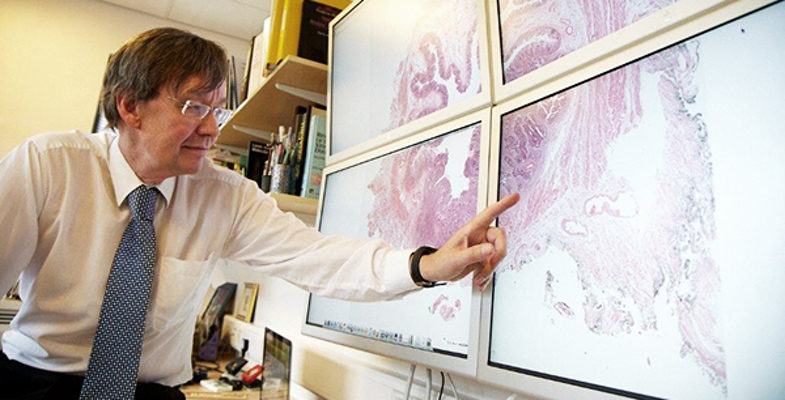Professor Phil Quirke
PROFESSOR PHIL QUIRKE
I have always been naturally inquisitive, wanting to know the reasons why things happen.
After completing university I applied for and obtained a year-long post-sophomore fellowship in Canada working alongside Pathology trainees and being exposed to GI pathology by David Owen. I published two case reports from Canada and then a third on my return to my 5th year.
I decided on academic pathology and worked in Leicester under Professor Eric Walker and Ian Talbot. Moving onto Leeds, I was appointed Registrar/Clinical Lecturer in 1982 under Professor Colin Bird and Mike Dixon.
Why consider academia? It is hard work but it allows one to be the master - or mistress - of one’s own career. The excitement of being the first person to see the experimental results of your own thoughts, to work in a team of energetic young people with great careers ahead of them, delivering your first talks at international conferences and seeing your results in print influencing scientific and medical thinking and practice.
A small project Mike Dixon and I started showed that simple pathology could predict local recurrence of rectal cancer. This has been a theme of research that still continues today of improving the management of bowel cancer.
I obtained my PhD and FRCPath by exam, learnt a wide range of techniques - getting interested in flow cytometry and DNA changes in tumours, the polymerase chain reaction and its uses in paraffin, embedded tissues in cancer and infection.
Now in 2015, this continues. Only now it is next generation sequencing and chips and slowly we can improve the treatment of disease. I learnt that clinical trials were a very strong method of translating science into practice, being involved in landmark studies such as:
- MRC Classic showing that key hole surgery was safe and effective.
- MRC CR07 where the combination of excellent surgery and radiotherapy almost abolished local recurrence, a range of chemotherapy trials and their molecular biology (MRC Focus 1-4).
- EME Rolar showing no major benefit of Robotic surgery and EME ENROL that showed enhanced recovery was valuable.
We now organise the pathology for over 24 national trials.
During my diverse career I have run a major histopathology service for 13 years, been Workforce and Research Director of the College, chaired the pathology committee for the NHS bowel cancer screening programme and have a major interest in academic training.

